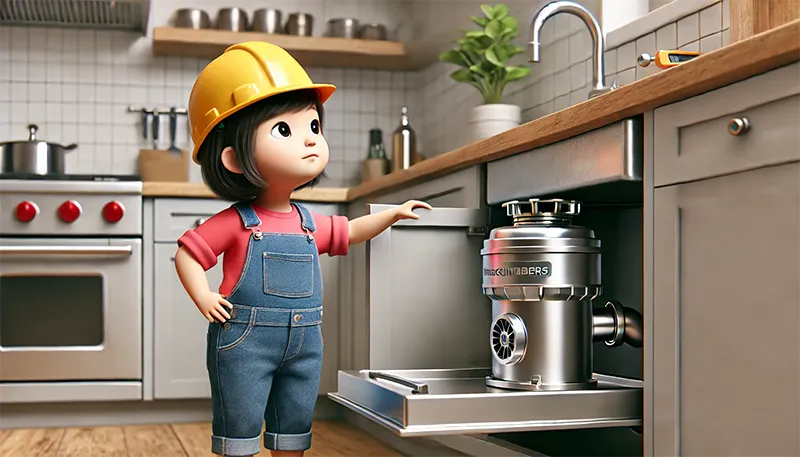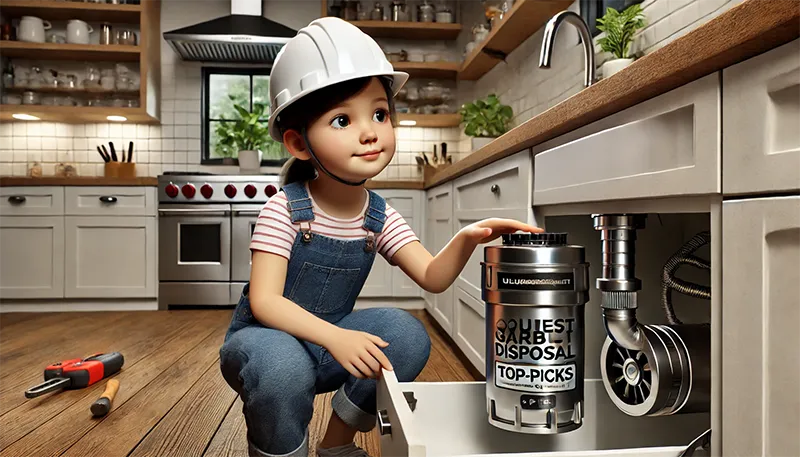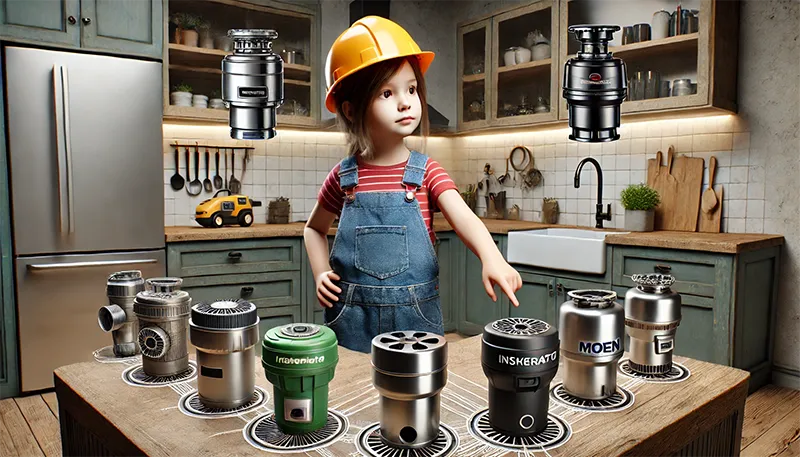In today’s fast-paced world, kitchen efficiency is a priority for many households. Among the various modern conveniences designed to enhance this efficiency, garbage disposals frequently appear on the list.
The decision to install one, however, often prompts questions such as, “Should I get a garbage disposal?” or “Are garbage disposals worth it?”
This article delves into these inquiries by examining the advantages and disadvantages, benefits, and potential drawbacks of garbage disposals.
By understanding these factors, you can make an informed decision about whether this kitchen appliance is suitable for your home.
What Is the Point of a Garbage Disposal?
Before we explore the intricacies of garbage disposals, it’s crucial to understand what they are and their primary purpose.
A garbage disposal is a device installed beneath the kitchen sink, designed to grind food waste into small particles. This grinding process facilitates the easy passage of waste through the plumbing system, helping to prevent clogs and enhancing the overall efficiency of waste management.
By incorporating a garbage disposal into your kitchen, you can streamline the disposal of food waste, potentially simplifying your daily kitchen chores.
Benefits of Garbage Disposal
Garbage disposals provide numerous advantages that can make them an appealing addition to your kitchen. Let’s delve into some of the key benefits:
1. Convenience
One of the foremost reasons homeowners opt for garbage disposals is the convenience they offer. By eliminating the need to scrape food waste into the trash, you can simply rinse it down the sink.
This not only saves time during meal clean-up but also reduces the volume of waste accumulating in your trash can, making kitchen management more efficient and less labor-intensive.
Additionally, garbage disposals can simplify meal preparation and cleanup. By disposing of waste directly into the sink, you can maintain a cleaner and more organized cooking space.
This can be particularly beneficial for those with busy lifestyles who value time-saving solutions.
2. Reduced Kitchen Odor
Food waste that lingers in your trash can quickly lead to unpleasant odors that permeate your kitchen. A garbage disposal addresses this issue by grinding and flushing food waste away immediately, helping maintain a fresh-smelling kitchen environment.
This not only enhances the overall atmosphere of your home but also reduces the need for frequent trash disposal.
Moreover, by minimizing the presence of decomposing waste in your kitchen, garbage disposals can contribute to a more hygienic environment. This can be particularly important for families with children or pets, where maintaining cleanliness is a top priority.
3. Environmental Benefits
Garbage disposals can offer environmental advantages by reducing the amount of waste sent to landfills. In landfills, organic materials decompose and release methane, a potent greenhouse gas that contributes to climate change. By using a garbage disposal, you can help divert waste from landfills, thereby lessening your environmental impact.
Furthermore, many modern wastewater treatment plants have the technology to convert organic waste from garbage disposals into energy or fertilizer.
This process not only mitigates the environmental burden but also supports sustainable waste management practices, aligning with the values of environmentally conscious individuals and communities.
4. Fewer Clogs
One of the practical benefits of garbage disposals is their ability to prevent clogs in your plumbing system.
By breaking down food waste into small particles, disposals help ensure that waste moves smoothly through pipes, reducing the likelihood of blockages.
This can save you from the inconvenience and expense of plumbing repairs, contributing to a more hassle-free kitchen experience.
In addition, a well-maintained garbage disposal can extend the lifespan of your plumbing system. By minimizing the risk of clogs and the associated wear and tear on pipes, you can potentially avoid costly and disruptive plumbing issues in the future.
Reasons Not to Have a Garbage Disposal
While garbage disposals offer several benefits, they are not without drawbacks. Here are some reasons you might decide against installing one:
1. Installation and Maintenance Costs
The initial installation of a garbage disposal involves plumbing and electrical work, which can be costly, especially if your kitchen is not already equipped to accommodate one.
This upfront investment may be a deterrent for those on a tight budget or living in rental properties where modifications are limited.
Moreover, garbage disposals require regular maintenance and occasional repairs, adding to the ongoing expenses.
From routine cleaning to addressing potential mechanical issues, the maintenance requirements can be a consideration for those who prefer low-maintenance appliances.
2. Noise
Garbage disposals are known for their noise, which can be disruptive, particularly in homes where the kitchen serves as a central gathering place. While newer models have been designed to operate more quietly, they can still produce significant noise levels, which may be bothersome for those who value a tranquil kitchen environment.
For individuals sensitive to noise or those living in open-concept homes where the kitchen is integrated with living spaces, the operational sound of a garbage disposal might outweigh its benefits. It’s important to consider the acoustics of your home and your personal noise tolerance when deciding on this appliance.
3. Not Suitable for All Waste
It’s important to note that not all food waste is suitable for disposal in a garbage unit. Fibrous materials, bones, and certain starchy foods can pose a risk to the disposal’s functionality, potentially leading to clogs or damage.
As a result, you’ll still need to dispose of certain waste types in the trash or consider composting as an alternative.
Understanding the limitations of garbage disposals is crucial for avoiding potential issues. Educating household members about what can and cannot be placed in the disposal can help maintain its functionality and prevent costly repairs.
4. Potential for Malfunctions
Like any appliance, garbage disposals can experience malfunctions that may disrupt your kitchen routine. Common issues include jams, leaks, and motor failures, which can result in plumbing problems or necessitate repairs.
While proper use and maintenance can reduce the risk of malfunctions, they remain a possibility that must be considered.
Being prepared for potential malfunctions involves understanding the basic troubleshooting steps and knowing when to seek professional assistance.
This awareness can help mitigate the impact of any issues that arise and ensure the continued smooth operation of your disposal.
Are Garbage Disposals Bad for the Environment?
There is a debate surrounding the environmental impact of garbage disposals. While they effectively reduce landfill waste, they also increase the load on wastewater treatment facilities.
he environmental implications largely depend on the capabilities of your local treatment plant and how it processes waste.
In regions where treatment plants can efficiently convert disposal waste into energy or fertilizer, the environmental benefits may outweigh the drawbacks.
However, in areas where treatment facilities are less advanced, the increased burden on these systems could negate the potential environmental advantages.
Evaluating Waste Disposal Units: Pros and Cons
To help you decide whether a garbage disposal is right for you, let’s summarize the pros and cons:
Pros:
- Convenience: Facilitates easy disposal of food waste, saving time and effort in the kitchen.
- Odor Reduction: Helps maintain a fresh-smelling kitchen environment by eliminating lingering food waste.
- Environmental Benefits: Contributes to reducing landfill waste and supports sustainable waste management practices.
- Fewer Clogs: Minimizes the risk of plumbing issues by breaking down food waste into small particles.
Cons:
- Costs: Involves both initial installation expenses and ongoing maintenance requirements.
- Noise: Can be disruptive, particularly in homes where quiet is valued.
- Limitations: Not suitable for all types of food waste, requiring careful consideration of what is placed in the disposal.
- Malfunctions: Possibility of operational issues that may lead to repairs or plumbing complications.
Do I Need a Garbage Disposal?
The decision to install a garbage disposal hinges on various factors, including your lifestyle, budget, and environmental priorities.
Here are some questions to help you determine if a disposal is a good fit for you:
- Do you often cook at home? If you frequently prepare meals, a garbage disposal can streamline kitchen cleanup and waste management.
- Are you concerned about kitchen odors? Disposals can help maintain a fresh-smelling kitchen by quickly eliminating food waste.
- Are you environmentally conscious? Consider your local waste management facilities and their capacity to process disposal waste effectively.
- Are you prepared for the cost? Assess the installation and maintenance expenses to ensure they align with your budget.
Conclusion
Garbage disposals can be a convenient and environmentally friendly solution for managing food waste. However, they come with costs, noise, and limitations that must be carefully weighed.
By evaluating the pros and cons, you can determine if a garbage disposal is a worthwhile investment for your kitchen. Ultimately, the choice depends on your personal needs, budget, and environmental values.
When deciding on a garbage disposal, it’s essential to consider how it will integrate into your daily routine and align with your lifestyle preferences.
Whether you choose to install a disposal or explore alternative waste management methods, the ultimate goal is to create a kitchen environment that suits your needs and supports your values, ensuring that your home remains a space of comfort and efficiency.



